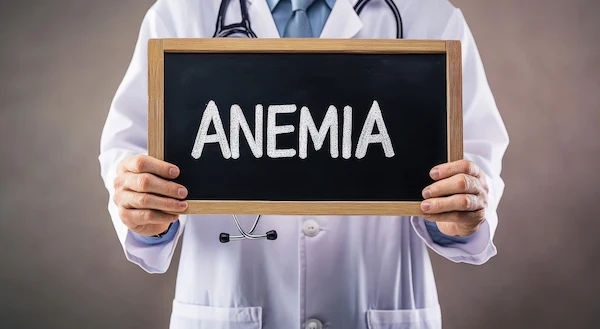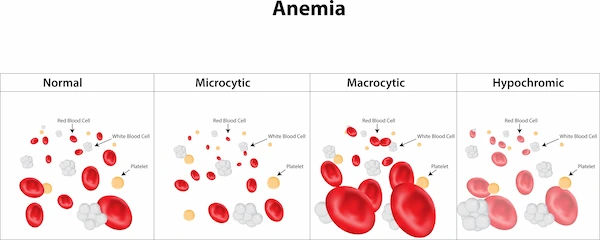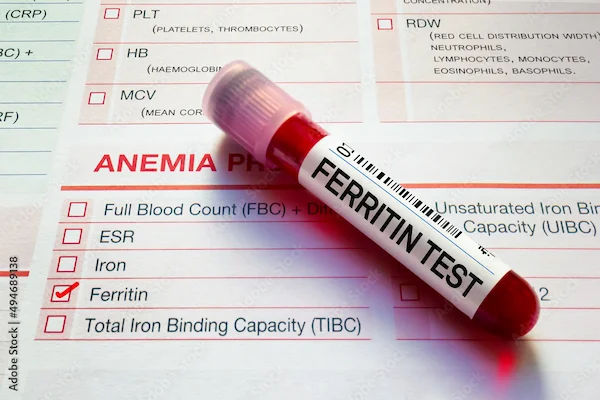Vitamin Deficiency Anaemia
Vitamin deficiency anaemia occurs when the body lacks sufficient vitamin B12 or folate, leading to the production of abnormally large red blood cells. Learn about its causes, symptoms, risk factors, diagnosis, treatment options, and prevention strategies to manage this condition effectively.

Written by Dr.Sonia Bhatt
Last updated on 3rd Jul, 2025

Introduction
Vitamin deficiency anaemia is a condition in which your body doesn’t produce enough healthy red blood cells. This primarily occurs when you have low levels of vitamin B12 or B9 (folate or folic acid).
Rather than producing healthy red blood cells, your body may produce abnormally large red blood cells. These enlarged cells are unable to carry oxygen throughout your body as efficiently as normal cells. Due to their size, vitamin deficiency anaemia is also known as macrocytic or megaloblastic anaemia. In this article, we will explore vitamin deficiency anaemia.
Causes of Vitamin Deficiency Anaemia
Vitamin deficiency anaemia can occur if you don’t consume enough foods containing vitamin B12 and folate, or if your body has difficulty absorbing or processing these vitamins.
1. Vitamin B12 Deficiencies
Low levels of vitamin B12 can be caused by:
Diet: Vitamin B12 is primarily found in meat, eggs, and milk, so people who don't consume these foods may need to take B12 supplements. Some foods, including certain breakfast cereals and nutritional yeast products, are fortified with B12.
Pernicious Anaemia: This condition occurs when the body’s immune system attacks cells in the stomach that produce a substance called intrinsic factor. Without this substance, B12 cannot be absorbed in the intestines.
Gastric Surgeries: If parts of your stomach or intestines have been surgically removed, this can reduce the production of intrinsic factor and limit the amount of space available for vitamin B12 absorption.
Intestinal Problems: Conditions such as Crohn’s disease and coeliac disease can interfere with the absorption of vitamin B12, as can tapeworms, which may be ingested from consuming contaminated fish.
2. Folate Deficiencies
Also known as vitamin B9, folate is mainly found in dark green leafy vegetables and liver. A folate deficiency can occur when individuals don't consume foods containing folate, or when their bodies are unable to absorb folate from food.
Absorption problems may be caused by:
Intestinal Diseases: Conditions such as coeliac disease.
Surgical Removal or Bypass of a Large Part of the Intestines.
Excessive Alcohol Consumption.
Prescription Medications: Certain anti-seizure medications can interfere with folate absorption.
Increased Demand: Pregnant women, women who are breastfeeding, and individuals undergoing dialysis for kidney disease have a higher requirement for folate.
A lack of folate can cause birth defects during pregnancy. However, folate deficiency is now less common in countries where folate is routinely added to food products like bread, cereals, and pasta.
Symptoms of Vitamin Deficiency Anaemia
Vitamin deficiency anaemia symptoms can be mild or subtle and may worsen gradually over several months or even years. You might experience:
Dizziness
Fatigue
Heart palpitations
Muscle weakness
Numbness or tingling in the hands or feet
Pale or yellowish skin
Shortness of breath (dyspnoea)
Unexplained weight loss
Vitamin deficiency can also lead to depression, and in severe cases, a vitamin B12 deficiency may cause confusion, forgetfulness, or even personality changes. In older individuals, this can sometimes be misinterpreted as dementia.
Risk Factors for Vitamin Deficiency Anaemia
Risk factors that may increase your likelihood of developing vitamin deficiency anaemia include:
Certain autoimmune diseases, such as Crohn’s disease, coeliac disease, and type 1 diabetes
Surgery to remove part of your stomach or intestine
Older age
Chronic alcohol consumption
Diagnosis of Vitamin Deficiency Anaemia
Diagnosing vitamin deficiency anaemia involves a combination of blood tests, a detailed medical history, and a physical examination to identify the underlying causes and confirm the presence of deficiencies in key vitamins like B12 and folate.
1. Blood Tests and Their Importance
Blood tests play a crucial role in diagnosing vitamin deficiency anaemia. These tests help assess the number and appearance of red blood cells, which can reveal abnormal cell sizes associated with the condition. Additionally, the levels of vitamin B12 and folate in the blood are measured to determine if deficiencies are contributing to the anaemia. In cases of suspected pernicious anaemia, the presence of antibodies to intrinsic factor may also be tested to confirm the diagnosis.
2. Medical History and Physical Examination
Alongside blood tests, your healthcare provider will review your medical history to identify any conditions or lifestyle factors that may increase your risk of vitamin deficiency anaemia, such as digestive issues, surgeries, or dietary habits. A physical examination will help detect signs of anaemia, such as pale skin or heart palpitations, and provide valuable insights into other possible causes of the symptoms.
Treatment Options
Vitamin deficiency anaemia is treated by supplementing the deficient vitamin. For pernicious anaemia, vitamin B12 is typically administered through injections and may need to be continued for life.
1. Vitamin B12 can be provided in several forms, including:
Injections into a muscle or under the skin
Oral tablets or pills
Dissolvable tablets or liquids that dissolve under the tongue
Nasal gels or sprays
2. Folate supplements are generally available as oral pills, although some forms may be given intravenously through a narrow, flexible tube directly into a vein.
Prevention of Vitamin Deficiency Anaemia
Certain forms of vitamin deficiency anaemia can be prevented by maintaining a balanced diet that includes a variety of nutrient-rich foods.
1. Foods that are high in vitamin B12 include:
Beef, liver, chicken, and fish
Eggs
Fortified foods, such as breakfast cereals
Milk, cheese, and yoghurt
2. Foods rich in folate include:
Broccoli, spinach, asparagus, and lima beans
Oranges, lemons, bananas, strawberries, and melons
Enriched grain products, such as bread, cereal, pasta, and rice
Liver, kidneys, yeast, mushrooms, and peanuts
3. The recommended daily intake for adults is:
Vitamin B12: 2.4 micrograms (mcg)
Folate (or folic acid): 400 micrograms (mcg)
4. Pregnant and breastfeeding women may need higher amounts of each vitamin.
5. Most people can obtain sufficient vitamins through their diet, but if you have a restricted diet or have undergone gastric bypass surgery, you may want to consider taking a multivitamin supplement.
Complications Related to Vitamin Deficiency Anaemia
If left untreated, vitamin deficiency anaemia can lead to a variety of serious health complications, including:
Pregnancy complications: Insufficient folate during pregnancy can increase the risk of birth defects in the developing fetus, particularly those affecting the brain and spinal cord.
Nervous system disorders: A prolonged deficiency in vitamin B12 can cause neurological issues, such as persistent tingling in the hands and feet, problems with balance, and mental confusion. Without proper treatment, it can lead to forgetfulness and cognitive decline, as vitamin B12 is essential for healthy brain function.
Gastric cancer: Pernicious anaemia, a type of vitamin B12 deficiency, has been linked to an increased risk of developing gastric or intestinal cancers.
Conclusion
Vitamin deficiency anaemia is a serious condition that can significantly impact your health if left untreated. It is primarily caused by insufficient levels of vitamin B12 or folate, leading to the production of abnormally large red blood cells that cannot efficiently carry oxygen. Early detection through blood tests and a thorough medical history is key to managing the condition effectively. Treatment typically involves supplementing the deficient vitamins, and a balanced diet rich in vitamin B12 and folate can help prevent certain types of anaemia. By addressing underlying causes and maintaining a healthy lifestyle, the risk of complications can be reduced, promoting better long-term health.
Consult Top General Physicians
Consult Top General Physicians

Dr. Vasanthasree Nair
General Practitioner
15 Years • MBBS
Angamaly
Apollo 24|7 Clinic - Kerala, Angamaly
(425+ Patients)

Dr. Mohammed Huzef Ul Arifeen
General Practitioner
3 Years • MBBS
Hyderabad
Apollo 24|7 Clinic - Telangana, Hyderabad

Dr. Rajib Ghose
General Practitioner
25 Years • MBBS
East Midnapore
VIVEKANANDA SEBA SADAN, East Midnapore

Dr Divya Lekha Gunta
General Practitioner
10 Years • MBBS, MD (Pathology)
Visakhapatnam
Apollo 24|7 Clinic - Andhra Pradesh, Visakhapatnam

Dr. Ramya Hari
General Practitioner
18 Years • Medical Head & Family Physician, DG Shipping Approved Doctor, Panel Physician - UK Visa Medicals
Chennai
Apollo Medical Centre Kotturpuram, Chennai

.webp)


